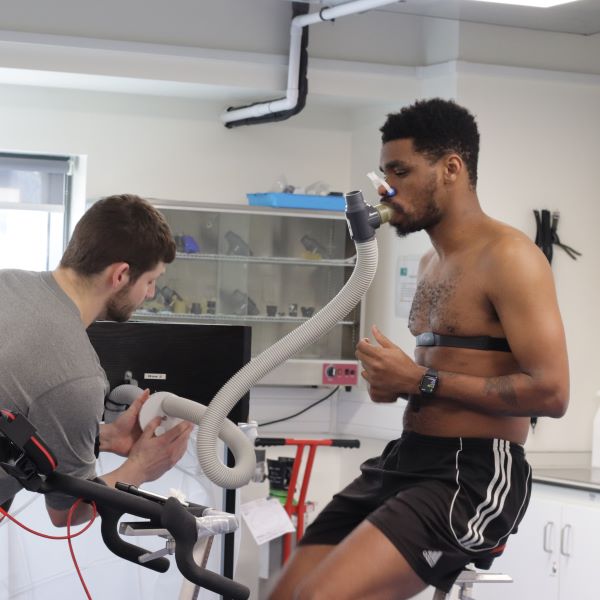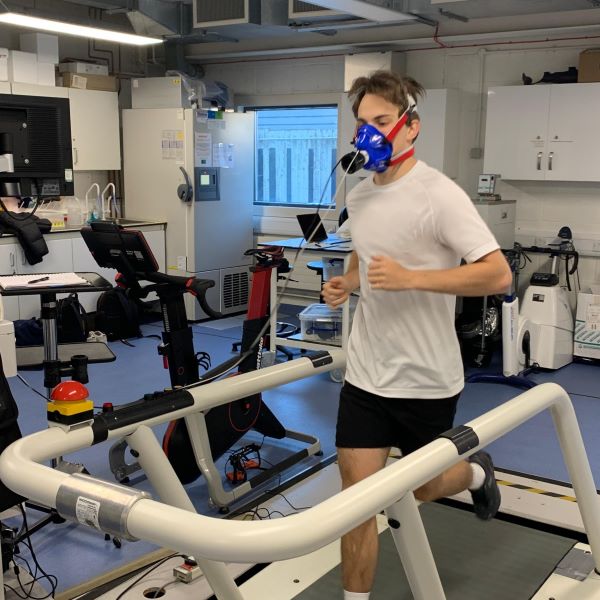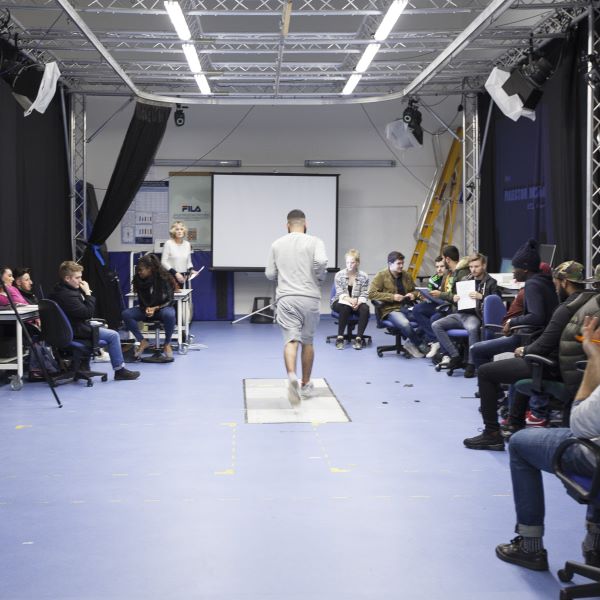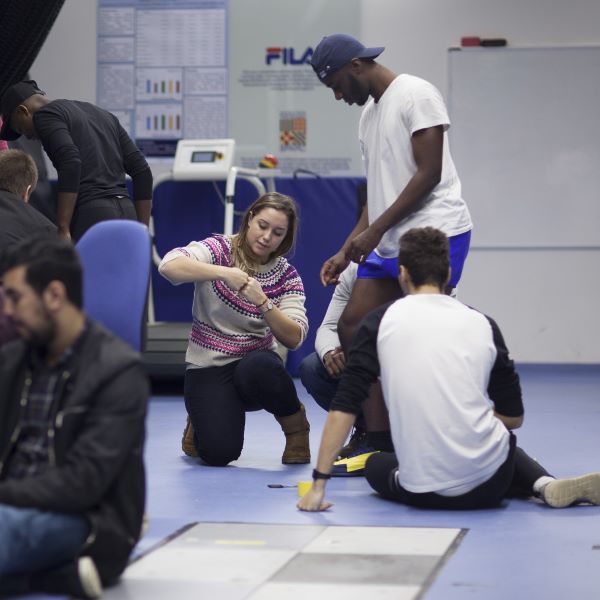/ Undergraduate /
Start date:
September 2025
You'll need:
112–128 UCAS points (or equivalent)
Foundation Year: 64–80 UCAS points (or equivalent)
UCAS Code:
C602
C600 (if choosing Foundation Year)

On-Campus Open Day
Saturday 12 July 2025
Tackle global health and performance challenges with our hands-on, CASES-endorsed programme.
Develop specialist skills in physiology, biomechanics, and psychology while gaining real-world experience.
Bridge elite sport and clinical health to enhance performance, support rehabilitation, and promote lifelong well-being through movement and exercise.
Did you know?
Our programme is endorsed by the Chartered Association of Sport and Exercise Sciences (CASES) which ensures evidence-based fitness training.
Additionally, this course equips you with the skills to become a CIMSPA-qualified Gym Instructor or Personal Trainer.
Ranked 1st for Learning Opportunities and Resources and Academic Support
(National Student Survey 2024 for Sport and Exercise Sciences)

Top 5 in London for Sports Science
(Guardian University Guide 2024)

4th in the UK for graduate prospects in Sports Science
(Times Good University Guide 2024)

Join an accredited and recognised programme
Our programme is also endorsed by the Chartered Association of Sport and Exercise Sciences (CASES), the UK's leading professional body for sport and exercise sciences. CASES ensures that our education and training adhere to the highest scientific and evidence-based best practices.
Why is this important?
- It represents our commitment to high standards of education and professional practice
- Enhances your credibility with future employers and clients
- Demonstrates your dedication to ethical, science-backed training methods

Our programme is accredited by CIMSPA (Chartered Institute for the Management of Sport and Physical Activity), which qualifies you as a Level 2 Gym Instructor and Level 3 Personal Trainer.
CIMSPA is the UK's leading professional body for the sport and physical activity sector, ensuring your qualifications meet national industry standards.
Your accreditation:
- Is recognised by top gyms and fitness employers
- Enhances your career opportunities and credibility
- Provides ongoing professional development for continuous growth

Modules
This course offers all students the option of a one-year paid work placement, to boost your employability even further. If you choose this route, you will take the placement following year two of your course, and then return to complete your degree.
Why take a placement?
A placement year is the perfect opportunity to gain valuable work experience, to build on the career skills we will teach you on this degree. The connections you make on the placement will improve your career prospects further, and equip you with the skills you need to secure graduate-level employment.
How we support you
The University's Placement and Work Experience Team are experts at helping you to secure a placement. They will work closely with you from the start, helping you research potential employers, discover placement opportunities, create and pitch your CV, and will coach you to perform well in interviews. We aren't able to guarantee a placement, but our sector-leading advisors will give you the best possible chance of securing one.
Find out more about how we'll support you
We understand that your plans might change once you start your programme. If you decide not to do a placement, you will have the option of completing the three year version of your programme.
Whatever your choice, you will have access to many opportunities for work experience through our Placement and Work Experience Team, and access to face-to-face and 24/7 online careers support.
This course offers a foundation year, which takes place at the beginning of your studies. Studying a foundation year will give you academic and practical experience, and a strong introduction to your subject, ensuring you succeed on your undergraduate degree.
30 credits
You will develop your core academic and integrated English language skills of speaking, listening, reading and writing. You will become familiar with key academic skills and concepts, such as referencing methods and awareness of academic integrity and tone. You will apply these skills and knowledge to both broad topics and also your chosen subject pathway.
Teaching and learning
You will be required to actively engage in on-campus learning for up to 10 hours a week.
You will be taught through a full range of teaching and learning methods, which include lectures, seminars, workshops, discussion groups, group directed tasks and presentations. This will enable you to learn from your peers and tutors in both structured and information settings.
You will be encouraged to think creatively about your approach to learning and discussions with your peers. You will also have access to recordings, resources, links and signposting through Moodle to enrich your learning.
Assessment
You will be assessed through group and individual presentations, comparative and reflective essays, multiple choice exams, coursework and reports, oral exams, portfolios, case studies and blogs.
30 credits
You will develop your research, numeracy and information technology skills. You will investigate the difference between primary and secondary research, conduct your own research project and demonstrate your findings through data analysis. You will also develop your awareness of equality, diversion and inclusion in the UK, through a real-world issue; discrimination in the workplace.
Teaching and learning
You will be required to actively engage in on-campus learning for up to 10 hours a week.
You will be taught through a full range of teaching and learning methods, which include lectures, seminars, workshops, discussion groups, group directed tasks and presentations. This will enable you to learn from your peers and tutors in both structured and information settings.
You will be encouraged to think creatively about your approach to learning and discussions with your peers. You will also have access to recordings, resources, links and signposting through Moodle to enrich your learning.
Assessment
You will be assessed through group and individual presentations, comparative and reflective essays, multiple choice exams, coursework and reports, oral exams, portfolios, case studies and blogs.
30 credits
This module provides you with an integrated exploration of human physiology and nutrition, offering a comprehensive understanding of how the human body functions and the critical role of nutrition in supporting health and wellbeing. It examines the interplay between physiological processes and nutritional requirements, highlighting their importance in maintaining homeostasis, supporting growth, and optimizing performance.
The module begins with foundational topics, such as cellular structure, tissue types, and the anatomy and physiology of key systems, including the digestive, cardiovascular, and respiratory systems. You will then delve into the principles of energy balance, metabolism, and hormonal regulation, exploring the roles of macronutrients, vitamins, and minerals in human health.
Other key topics include fluid and electrolyte balance, the relationship between nutrition and immune function, and the nutritional demands of exercise and physical activity.
By the end of the module, you will be equipped with the foundational knowledge and practical skills necessary to apply physiological and nutritional principles to health promotion, disease prevention, and performance optimisation.
Teaching and learning
Through a combination of lectures, practical sessions, and discussions, you will develop the ability to critically analyse the integration of physiology and nutrition in promoting health. You will also gain insight into the consequences of imbalances, such as nutrient deficiencies, metabolic disorders, and the impact of malnutrition on the immune system.
The teaching delivery for each module consists of one, one-three-hour lecture and one, two-hour seminar per week. Lectures will cover core indicative content, while seminars will consist of research workshops, small group learning on relevant case studies and practical lab sessions.
You will also have an additional 30 minutes of online support each week, which will consist of formal preparation/review of lab sessions, or exam preparation (e.g. quizzes).
Assessment
This module will be assessed using an open book exam and a case study report.
50% - open book multiple choice exam, consisting of 30 questions.
50% - case study report, that explores the interaction between a physiological system and nutrition in maintaining health or contributing to disease.
30 credits
This module will explore critical aspects of research in Sports Science, Management and Therapy through methods of scientific thinking, techniques and experimental design, and will provide an opportunity to investigate the use of several techniques in all three disciplines.
You will be encouraged to explore correlational and experimental methods, the role of statistics, scientific argumentation and ethical working practices in relation to current scientific topics as reflected in news reports, recent academic publications and historical case studies. You will also be encouraged to critically debate relevant topics in sport and evaluate the need for rigorous quantitative and qualitative evidence in sports research.
You will begin with an introduction to the importance of evidence-based practice and the scientific method, progressing to an exploration of qualitative and quantitative research designs, data collection techniques, and ethical considerations. You will also gain hands-on experience with statistical analysis and the use of technological tools in sports research, such as wearable devices and performance monitoring equipment.
Teaching and learning
The module emphasises the development of professional communication skills, including scientific writing, data presentation, and effective poster presentations. Through workshops, case studies, and discussions, you will learn to identify potential biases and limitations in research, critically assess findings, and communicate results in a clear and impactful manner.
The teaching delivery for each module consists of one, one-three-hour lecture and one, two-hour seminar per week.
You will have a diverse learning experience of interactive workshops, case studies, practical exercises, group discussions, problem-based learning and guest speakers.
You will also have an additional 30 minutes of online digital support each week to enhance your understanding and learning.
Assessment
This module will be assessed using an information poster and reflections and a research proposal.
30% - informative poster, you will create a research poster that critically examines two contrasting prospectives on a chosen sports research topic.
70% - research proposal, develop a detailed research proposal on a specific sports-related topic of your choice.
These modules are those we currently offer and may be subject to change.
Foundation Year
This course can also be studied with a foundation year (September entry only).
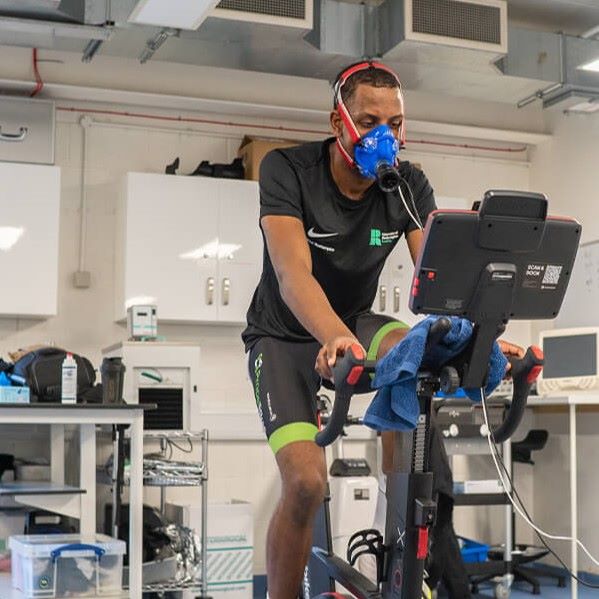
Skills
Transform lives and enhance performance with a degree in Sport and Exercise Sciences.
Ranked among the best in London, our programme equips you with the knowledge and practical skills to build a fulfilling career in the health, fitness, and sports industries.
You will gain a deep understanding of the science behind the human body, human performance, injury prevention, and recovery by exploring three core disciplines:
- Physiology – Understand how the body functions and adapts to exercise.
- Biomechanics – Analyses mechanics of movement and the forces that shape it.
- Psychology – Examine the mental factors influencing behaviour and performance.
This programme keeps you at the forefront of the field by studying the latest advancements, developing expertise in sport science support, and applying your skills in real-world settings through our optional workplace learning modules.
Check out our state-of-the-art facilities
Our world-class sports and exercise physiology laboratory is based at Whitelands College, a beautiful, listed building next to Richmond Park.
We offer a host of state-of-the-art facilities used by top professional athletes including:
Experience what it is like to exercise or live in extreme conditions by stepping into our walk-in environmental chamber. The environmental chamber can simulate extreme temperatures and high altitude and is regularly used for teaching and research, and by elite athletes from a range of sports (e.g., Formula One, tennis, and ultra-endurance running) as part of their preparation for competitions.
Our spacious human physiology laboratories are equipped with all the high-end equipment required to comprehensively assess the health and/or performance levels of human participants. The laboratories are the best place to measure body composition (BodPod, bioelectrical impedance, and callipers), and key physiological markers of health and performance such as VO2max (using metabolic carts), cerebral and peripheral blood flow (using dopplers and ultrasound), and neuromuscular function (using transcranial magnetic and electrical stimulation) while running, cycling, or rowing. Analysis of blood, urine, and sweat can be performed on-site to provide a more complete picture.
A state-of-the-art Vicon motion analysis system, featuring multiple high-resolution cameras and the latest video management software.
We have BodyBuilder software, which allows for the easy and quick implementation of biomechanical models. The system can be synchronised with the force plates to determine joint torques, work, and power.
The Peak Motus 3D motion analysis system is also available for motion tracking using standard cameras.
This system can be used both inside and outside the laboratory.
Three force plates are mounted in the floor in a flexible manner and can be used to measure ground reaction forces in three dimensions, as well as the centre of pressure.
Our laboratory is equipped with Fastrak electromagnetic motion sensors, which provide real-time kinematic data using custom software developed by our research team. We also have a variety of other motion sensors (accelerometers and inertial sensors with built-in accelerometry, gyroscopes, and magnetometers) based on inertial technologies. Unlike the Fastrak, some of our inertial sensors are wireless, meaning their applications are not restricted by cables.
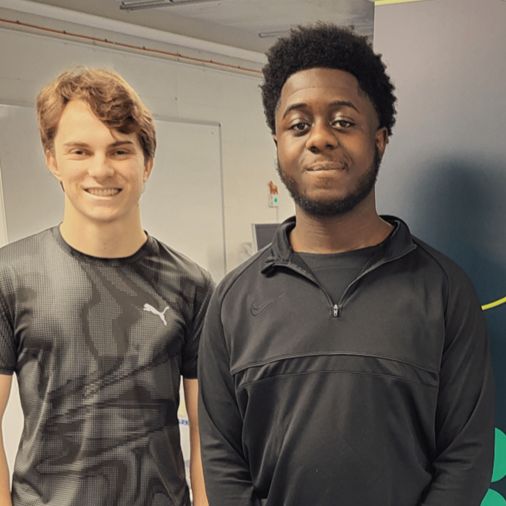
Here at Roehampton we offer bespoke, hands-on experiences for our students.
McLaren F1 driver Oscar Piastri is one of the top sports stars who use our facilities on campus.
BSc Sport and Exercise Sciences student Jotham Yamoah was offered the chance to work with the star and wrote about the experience.
Learning
Experience a dynamic curriculum in state-of-the-art facilities
You will be taught a hands-on programme, combining problem-based learning, case studies, and laboratory classes to improve your scientific understanding and practical expertise.
You’ll gain the skills to prescribe, evaluate, and monitor exercise programmes tailored to the human body through individual and group work.
The modules on this programme provide a comprehensive foundation in physiology, biomechanics and psychology preparing you for your future career.
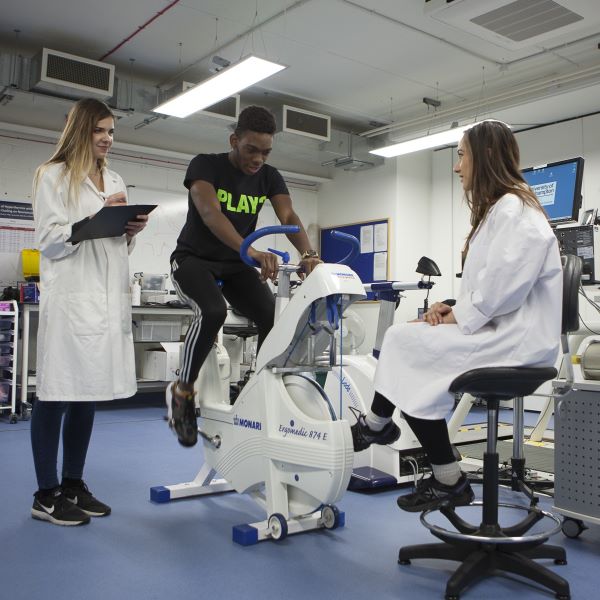
Assessment
Push yourself with real-world assignments.
Throughout the course, you’ll engage in various assessments that enhance both your theoretical knowledge and practical skills, including online tests, exams, laboratory reports, presentations, essays, and research projects. By the end of your studies, you'll have a strong grasp of sports and exercise sciences ready to enter the sector.
In your final year, you can choose between a traditional research dissertation or a practice-based project, offering flexibility depending on your interest in either generating new knowledge or providing sport science support to clients. This ensures a well-rounded and comprehensive understanding of the field.
Hear from our students
"The course at Roehampton has challenged me to think wider, try new tasks, and build confidence in helping others. My lecturers have given me so much support throughout the course, which I hugely appreciate, they always take time for a chat."
Siri Aastrom, BSc Sport and Exercise Sciences student

Careers
Shape the future of human performance with a degree from Roehampton
At Roehampton, we’re committed to equipping you with the tools, knowledge, and confidence to succeed across the health, fitness, and sport sectors. Lifelong learning sits at the core of our programme, empowering you to realise your potential and thrive in a fast-moving, ever-evolving industry.
Our programme combines academic excellence with practical experience. You’ll develop expertise across key disciplines, including Exercise Physiology, Sports Nutrition, Biomechanics, Sport Psychology, and Strength and Conditioning. Through embedded qualifications, such as CIMSPA, you’ll be certified and career-ready — able to start working and gaining industry experience even before you graduate.
Whether your ambition is to work in sport performance, personal training, health promotion, coaching, performance analysis, or sport development, our programme prepares you for real-world impact. You’ll also have a clear pathway into teaching, research, or further study, with options to pursue MScs, PGCEs, PhDs, and careers in academia or scientific research.

Open days
Get a real taste of our campus, community and what it’s like to study at Roehampton
Applying
Full-time UK undergraduate students apply through UCAS.
Course subject to curriculum review and validation.
Entry tariff
112–128 UCAS points (or equivalent)
Foundation Year: 64–80 UCAS points (or equivalent)
Looking to work out your UCAS points or find out about our entry requirements? Find out more.
When we consider applications to study with us, we form a complete view of your achievements to date, and future potential, and can offer flexibility in entry requirements. Find out more about our Contextual Offer scheme.
Specific entry requirements
A-level / BTEC (or equivalent qualification) required in a science, sports science, PE or Psychology subject.
GCSE (or equivalent) requirement: Maths Grade C / 4.
General entry requirements
September 2025 entry tuition fees
UK (home) tuition fees
Undergraduate degree: £9,535
Foundation Year: £9,535
We offer a wide range of scholarships and bursaries. See our financial support pages for UK students.
We also provide other ways to support the cost of living, including free buses and on-campus car parking, hardship support and some of the most affordable student accommodation and catering in London. Find out more about how we can support you.
Course subject to curriculum review and validation.
International undergraduate students apply through our direct application system.
Entry tariff
112–128 UCAS points (or equivalent)
Foundation Year: 64–80 UCAS points (or equivalent)
Looking to work out your UCAS points or find out about our entry requirements? Find out more.
When we consider applications to study with us, we form a complete view of your achievements to date, and future potential, and can offer flexibility in entry requirements. Find out more about our Contextual Offer scheme.
General entry requirements
September 2025 entry tuition fees
EU and international tuition fees
Undergraduate degree: £16,950
Foundation Year: £16,950
International Foundation Pathway: £16,950
We offer a wide range of scholarships and bursaries. See our financial support pages for international students.
We also provide other ways to support the cost of living, including free buses and on-campus car parking, hardship support and some of the most affordable student accommodation and catering in London. Find out more about how we can support you.


